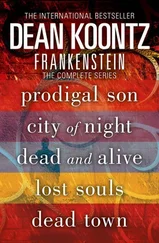In bed, lights out, Junior marveled at his daredevil spirit. He never stopped surprising himself.
Neither guilt nor remorse plagued him. Good and bad, right and wrong, were not issues to him. Actions were either effective or ineffective, wise or stupid, but they were all value neutral.
He didn't wonder about his sanity, either, as a less self-improved man might have done. No madman strives to enhance his vocabulary or to deepen his appreciation for culture.
He did wonder why he had chosen this night of all nights to become even a more fearless adventurer, rather than a month ago or a month hence. Instinct told him that he'd felt the need to test himself, that a crisis was fast approaching, and that to be ready for it, he must be confident that he could do what had to be done when the crunch came. Slipping into sleep, Junior suspected that Prosser might have been less lark than preparation.
Further preparation-the purchase of gold coins and diamonds, the establishment of false identities-had to be delayed due to the hives. An hour short of dawn, Junior was awakened by a fierce itching not limited to his phantom toe. His entire body, over every plane and into every crevice, prickled and tingled and burned as with fever-and itched.
Shuddering, rubbing furiously at himself, he stumbled into the bathroom. In the mirror, he confronted a face he hardly recognized: swollen, lumpy peppered with red hives.
For forty-eight hours, he pumped himself full of prescription antihistamines, immersed himself in bathtubs brimming with numbingly cold water, and lathered himself with soothing lotions. In misery, gripped by self-pity, he dared not think about the 9-mm pistol that he had stolen from Frieda Bliss.
By Thursday, the eruption passed from him. Because he'd had the self-control not to claw his face or hands, he was presentable enough to venture out into the city; although if people in the streets could have Seen the weeping scabs and inflamed scratches that tattooed his body and limbs, they would have fled with the grim certainty that the black plague or worse was loose among them.
During the following ten days, he withdrew money from several accounts. He converted selected paper assets into cash, as well.
He also sought a supplier of high-quality counterfeit ID. This proved easier than he anticipated.
A surprising number of the women who had been his lovers were recreational drug users, and over the past couple years, he had met several dealers who supplied them. From the least savory of these, he purchased five thousand dollars' worth of cocaine and LSD to establish his credibility, after which he inquired about forged documents.
For a finder's fee, Junior was put in touch with a papermaker named Google. This was not his real name, but with his crossed eyes, large rubbery lips, and massively prominent Adam's apple, he was as perfect a Google as ever there had been.
Because drugs foil all efforts at self-improvement, Junior had no use for the cocaine and acid. He didn't dare sell them to recover his money; even five thousand dollars wasn't worth risking arrest. Instead, he gave the pharmaceuticals to a group of young boys playing basketball in a schoolyard, and wished them a Merry Christmas. The twenty-fourth of December began with rain, but the storm moved south soon after dawn. Sunshine tinseled the city, and the streets filled with last-minute holiday shoppers.
Junior joined the throngs, although he had no gift list or feeling for the season. He just needed to get out of his apartment, because he was convinced that the phantom singer would soon serenade him again.
She hadn't sung since the early-morning hours of October 18, and no other paranormal event had occurred since then. The waiting between manifestations scraped at Junior's nerves worse than the manifestations themselves.
Something was due to happen in this peculiar, extended, almost casual haunting under which he had suffered for more than two years, since finding the quarter in his cheeseburger. While all around him in the streets, people bustled in good cheer, Junior slouched along in a sour mood, temporarily having forgotten to look for the bright side.
Inevitably, man of the arts that he was, his slouching brought him to several galleries. In the window of the fourth, not one of his favorite establishments, he saw an eight-by-ten photograph of Seraphim White.
The girl smiled, as stunningly beautiful as he remembered her, but she was no longer fifteen, as she had been when last he'd seen her. Since her death in childbirth nearly three years ago, she'd matured and grown lovelier than ever.
If Junior had not been such a rational man, schooled in logic and reason by the books of Caesar Zedd, he might have snapped there in the street, before the photograph of Seraphim, might have begun to shake and sob and babble until he wound up in a psychiatric ward. But although his trembling knees felt no more supportive than aspic, they didn't dissolve under him. He couldn't breathe for a minute, and his vision darkened at the periphery, and the noise of passing traffic suddenly sounded like the agonized shrieks of people tortured beyond endurance, but he held fast to his wits long enough to realize that the name under the photo, which served as the centerpiece of a poster, read Celestina White in four-inch letters, not Seraphim.
The poster announced an upcoming show, titled “This Momentous Day,” by the young artist calling herself Celestina White. Dates for the exhibition were Friday, January 12, through Saturday, January 2 7.
Warily, Junior ventured into the gallery to make inquiries. He expected the staff to express utter bafflement at the name Celestina White, expected the poster to have vanished when he returned to the display window.
Instead, he was given a small color brochure featuring samples of the artist's work. It also contained the same photograph of her smiling face that graced the window.
According to the brief biographic note with the picture, Celestina White was a graduate of San Francisco's Academy of Art College. She had been born and raised in Spruce Hills, Oregon, the daughter of a minister.
AGNES ALWAYS ENJOYED Christmas Eve dinner with Edom and Jacob, because even they tempered their pessimism on this night of nights. Whether the season touched their hearts or they wanted even more than usual to please their sister, she didn't know. If gentle Edom spoke of killer tornadoes or if dear Jacob was reminded of massive explosions, each dwelt not on horrible death, as usual, but on feats of courage in the midst of dire catastrophe, recounting astonishing rescues and miraculous escapes.
With Barty's presence, Christmas Eve dinners had become even more agreeable, especially this year when he was almost-three-going-on-twenty. He talked about the visits to friends that he and his mother and Edom had made earlier in the day, about Father Brown, as if that cleric-detective were real, about the puddle-jumping toads that had been singing in the backyard when he and his mother had arrived home from the cemetery, and his chatter was engaging because it was full of a child's charm yet peppered with enough precocious observations to make it of interest to adults.
From the corn soup to the baked ham to the plum pudding, he did not speak of his dry walk in wet weather.
Agnes hadn't asked him to keep his strange feat a secret from his uncles. In truth, she had come home in such a curious state of mind that even as she'd worked with Jacob to prepare dinner and even as she'd overseen Edom's setting of the table, she hesitated to tell them what had happened on the run from Joey's grave to the station wagon. She fluctuated between guarded euphoria and fear bordering on panic, and she didn't trust herself to recount the experience until she had taken more time to absorb it.
Читать дальше











